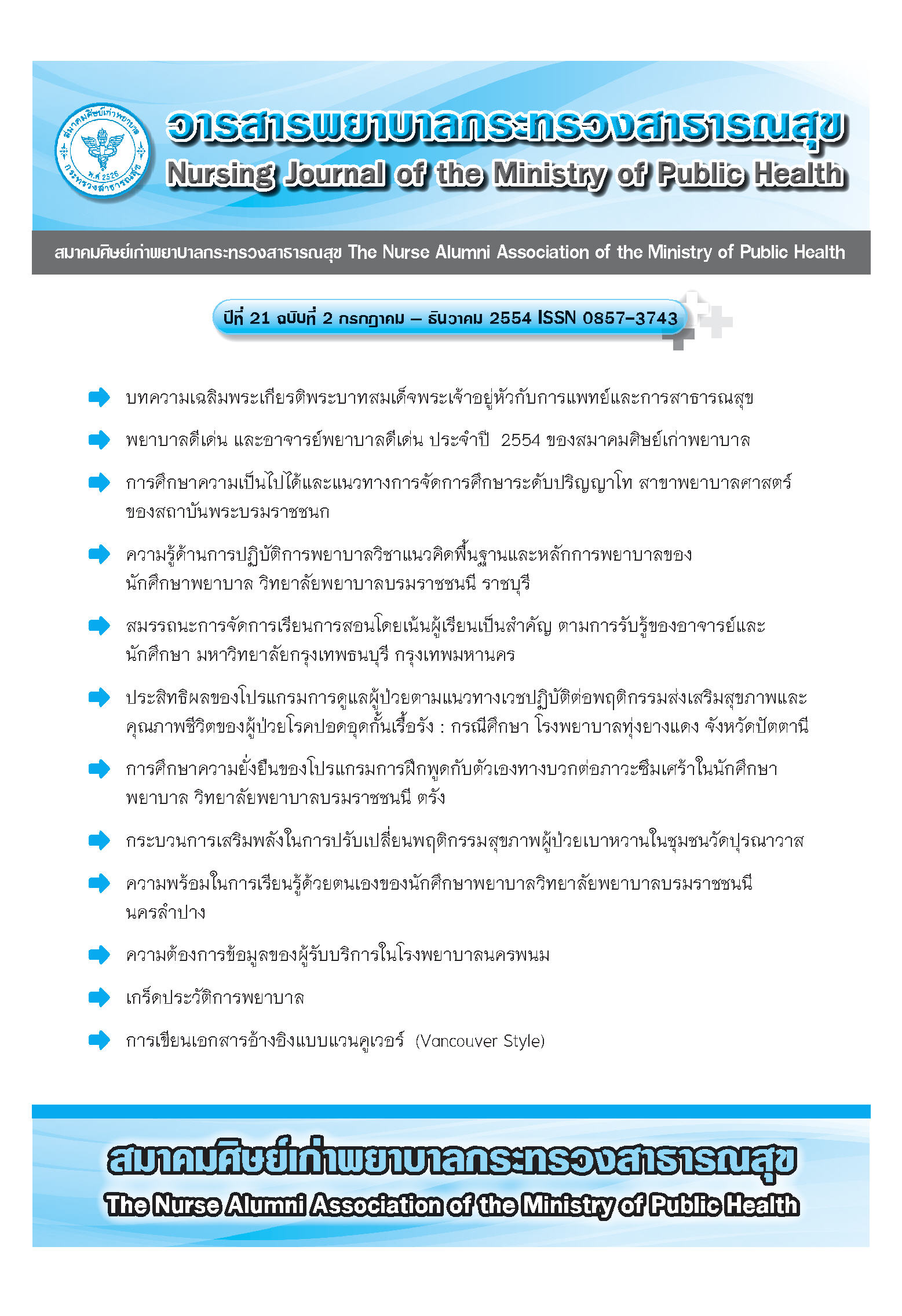การศึกษาความเป็นไปได้และแนวทางการจัดการศึกษาระดับปริญญาโท สาขาพยาบาลศาสตร์ ของสถาบันพระบรมราชชนก
Main Article Content
Abstract
บทคัดย่อ
การวิจัยเรื่อง การศึกษาความเป็นไปได้และแนวทางการจัดการศึกษาระดับปริญญาโท สาขาพยาบาลศาสตร์ ของสถาบันพระบรมราชชนก มีวัตถุประสงค์เพื่อศึกษาสภาพปัจจุบัน แนวโน้ม และความต้องการศึกษาต่อระดับปริญญาโทสาขาพยาบาลศาสตร์ของบุคลากรพยาบาล, วิเคราะห์ความเป็นไปได้และความพร้อมในการจัดการศึกษาระดับปริญญาโทสาขาพยาบาลศาสตร์ของสถาบันพระบรมราชชนก และนำเสนอแนวทางในการจัดการศึกษาระดับปริญญาโทสาขาพยาบาลศาสตร์ของสถาบันพระบรมราชชนก กลุ่มตัวอย่าง ประกอบด้วย นักศึกษาพยาบาลชั้นปีที่ 4 357 คน,พยาบาลประจำการ 2,279 คน, อาจารย์พยาบาลที่มีวุฒิการศึกษาปริญญาตรี 308 คน, ผู้บริหารโรงพยาบาล 280 คน, ผู้บริหารวิทยาลัยพยาบาล 29 คน และ ผู้ทรงคุณวุฒิทางการพยาบาล 5 คน
ผลการวิจัยพบว่า ยุทธศาสตร์สำหรับการจัดการศึกษาระดับมหาบัณฑิตของสถาบันพระบรมราชชนก ประกอบด้วย 1. หลักสูตรการเรียนการสอน ได้แก่ 1) จัดหลักสูตรในภูมิภาคที่มีความพร้อม โดยจัดหลักสูตรใหม่ในแต่ละภูมิภาค เน้นให้ให้คณาจารย์มาร่วมมือกันจัดทำหลักสูตร 2) จัดหลักสูตรร่วมมือกับสถาบันภายนอก เช่น โรงพยาบาลที่เป็นโรงเรียนแพทย์หรือโรงพยาบาลชั้นนำ และมหาวิทยาลัย เนื่องจากการประสาทปริญญาเองไม่ได้ 3) จัดหลักสูตรที่สามารถรองรับวุฒิบัตรวิชาชีพพยาบาล ที่รับรองการดำรงสถานภาพทุก 5 ปี 4) เปิดหลักสูตรนอกเวลาเรียนวันธรรมดาช่วงเย็นหรือเสาร์ อาทิตย์ 5) วิธีการเรียนการสอนเป็นแบบ Problem-based Learning, Research-based Learning และ E-Learning 6) การถ่ายโอนหน่วยกิต หรือการนำประสบการณ์การทำงานมาประมวลเป็นองค์ความรู้แล้วคิดเป็นหน่วยกิตให้กับผู้เรียน โดยที่ผู้เรียนไม่ต้องเรียนในบางรายวิชาซึ่งมีประสบการณ์มาแล้ว 2. คณาจารย์ ได้แก่ 1) การพัฒนาคุณภาพคณาจารย์พยาบาลจากการส่งเสริมให้พยาบาลประจำการที่มีประสบการณ์เพิ่มคุณวุฒิโอน/ย้ายมาเป็นอาจารย์พยาบาล 2) ระดมอาจารย์ร่วมสอน และร่วมมือกันจัดทำหลักสูตร 3. การบริหารจัดการ ได้แก่ 1) ใช้เครือข่ายของแหล่งฝึกที่เป็นหน่วยงานในกระทรวงสาธารณสุข ทำให้สะดวกในการบริหารจัดการ และลดค่าใช้จ่าย 2) การบริหารจัดการทรัพยากรต่างๆ เพื่อให้เกิดประโยชน์สูงสุด บัณฑิตที่สำเร็จการศึกษามีงานทำทุกคน การขยายแหล่งบริการสาธารณสุข และผู้นำทางการศึกษา รูปแบบประกอบด้วย โครงสร้างหลักสูตร สาขาวิชาที่เปิดนำร่อง เครือข่ายของสถาบันพระบรมราชชนก ลักษณะการเรียนการสอน สำหรับกลไกการจัดการศึกษา ประกอบด้วย 1) กลไกการจัดตั้งศูนย์การศึกษาปริญญาโทนำร่องระดับภูมิภาค 2) กลไกการคัดเลือกนักศึกษา 3) กลไกด้านการพัฒนาอาจารย์ 4) กลไกด้านการบริหารงานบุคลากรและทรัพยากร 5) กลไกการจัดการเรียนการสอน 6) กลไกส่งเสริมการตลาด 7) กลไกในการสร้างความร่วมมือเพื่อสนับสนุนทุนการศึกษา
คำสำคัญ: ปริญญาโท, พยาบาลศาสตร์, สถาบันพระบรมราชชนก
Abstract
The Praboromarajchanok Institute Graduate Nursing Science Programme Feasibility and Management Study has three objectives: to study current conditions, trends and demand for continued nursing science education at the graduate level of nursing personnel; to analyze the possibility and the readiness of Praboromarajchanok Institute in the management of a graduate nursing science programme; and, to present guidelines for the management of the graduate nursing science programme of the Praboromarajchanok Institute. The population and the samples comprised 1) 357 fourth year nursing students 2) 2,279 nurses stationed at numerous hospitals 3) 308 nursing instructors with a bachelor’s degree 4) 280 hospital executives 5) twenty-nine executives from the twenty-nine nursing colleges; and, 6) five qualified nursing scholars.
The study has identified the following strategies for the management of the graduate nursing science programme of the Praboromarajchanok Institute. 1.Curricula: 1) Develop a new curriculum for each of the regions with the emphasis on involvement by the faculty. 2) Develop a collaborative curricula with third party institutions, such as university hospitals or other leading hospitals, and universities. This is because the Praboromarajchanok Institute is not authorized to confer degrees on its own. 3) Develop curricula which are in compliance with nursing professional certificates with renewal status every five years. 4) Offer evening or weekend training programs. 5) Using problem-based learning, research-based learning and E-Learning teaching strategies. 6) Credit transfer or recognition of work experience as knowledge and the granting of credits without the requirement of the learners to enroll in certain courses of which they have had prior experience with. 2. Faculty: 1) Improvement of nursing faculty quality by encouraging experienced, stationed nurses to upgrade to professional nurses. 2) Engage professionals to undertake instruction and the development of the curricula. 3. Management: 1) Afford convenience and reduced expenses by using units under Ministry of Public Health as training sites. 2) Manage resources to ensure the greatest benefits, employment of all graduates, expansion of public health services and the development of educational leaders. The model comprises curriculum structure, pilot courses, understanding the network of Praboromarajchanok Institute and the nature of instruction. The educational management mechanisms comprise: 1) mechanisms for the establishment of pilot regional graduate education centers; 2) mechanisms for the selection of students; 3) mechanisms for faculty development; 4) mechanisms for the management of personnel and resources; 5) mechanisms for instructional management; 6) mechanisms for marketing promotion; and, 7) mechanisms for the development of educational collaboration.
Key words: Master degree, Nursing, Praboromarajchanok Institute
Article Details
บทความและรายงานวิจัยในวารสารพยาบาลกระทรวงสาธารณสุข เป็นความคิดเห็นของ ผู้เขียน มิใช่ของคณะผู้จัดทำ และมิใช่ความรับผิดชอบของสมาคมศิษย์เก่าพยาบาลกระทรวงสาธารณสุข ซึ่งสามารถนำไปอ้างอิงได้

